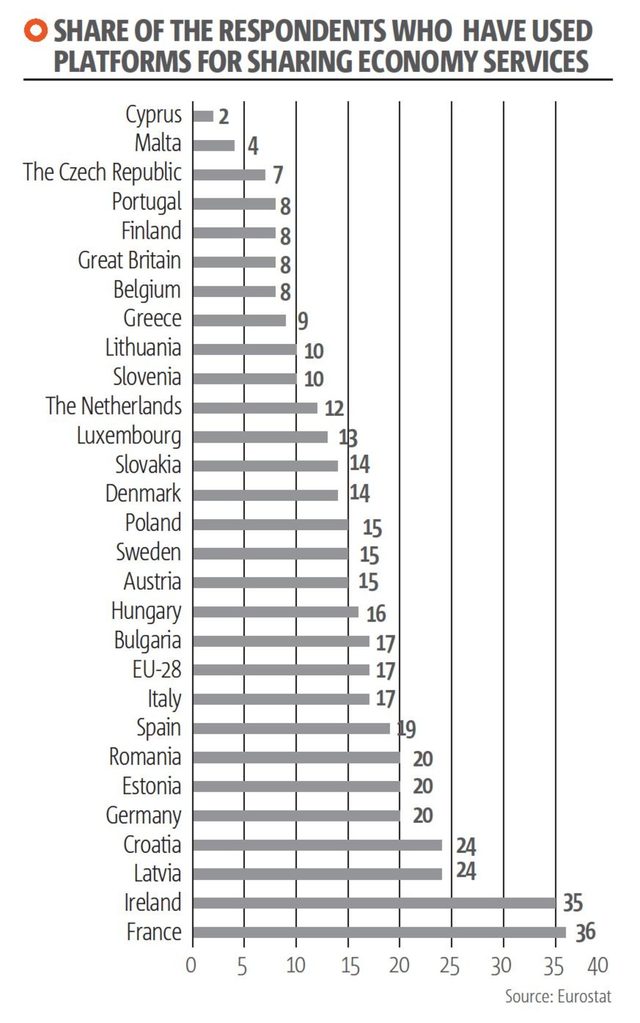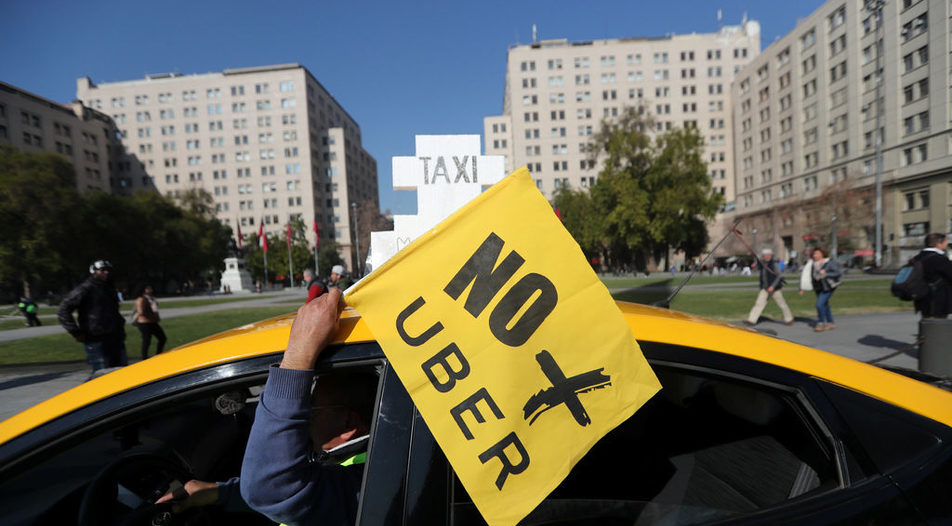There are few areas in which Bulgaria outstrips a number of European countries, including old EU member states such as Germany and Austria, as well as regional peers such as Poland and Romania. The sharing economy is one of them.
Recently the Nordic free market think-tank Timbro published the pilot edition of a global Sharing Economy Index, compiled on the basis of traffic data and scraping tools. Among 213 countries and dependancies, included in the ranking, Bulgaria occupies the commendable 63th place.
One of the explanations for this relatively good standing of Bulgaria is given by Timbro analysts. It appears that countries with relatively high share of tourism industry in their economy stand at the forefront of the ranking. Indeed, Iceland leads the ranking, followed by the Turks and Caicos Islands, Malta, Montenegro, New Zealand and Croatia.

The biggest supplier of sharing economy services on a global scale, as identified by the study, is Airbnb. Bulgaria is no exception, with Airbnb becoming increasingly popular for short-term rent among both foreign and local travelers. The expansion of Airbnb's services in Bulgaria can be also attributed to the launch of operations in the country of two low-cost airlines - Wizzair and Ryanair - a couple of years ago. This is clearly seen in the stable rise in the number of incoming passengers at the biggest airport in Bulgaria, in the capital Sofia, that peaked at double digits in 2016-2017. The discovery of Bulgaria as a cheap and attractive weekend tourist destination - primarily among other European nationals - has naturally spurred demand for short-term rent. Noteworthy, more and more property for sale in Sofia's downtown and other popular tourist locations is advertised with the opportunity to be rented out via Airbnb.
In contrast to the rapid, market-driven penetration of Airbnb in Bulgaria, the sharing economy in transportation services has come nowhere close. The world's most recognizable brand, Uber, started operations in Bulgaria on December 9, 2014 with the launch of its low-price UberX service in Sofia but was forced to halt it in the autumn of 2015. By that time, UberX had attracted some 40,000 clients in the capital and had recruited 20 engineers for its software development center.
Uber had to close down its transportation business in Sofia after the Commission for Protection of Competition ruled that the company violated the Bulgarian competition law. The anti-trust authority imposed a fine of 200,000 levs (102,258 euro) on Uber and ordered the company to immediately cease its transportation operations in the country. The main argument of the commission was that UberX was not a form of a shared travel service, because it was not free-of-charge (in contrast to shared travel platforms, which presumably are).
Thus, at present Uber continues to grow solely its software development business in Bulgaria and Sofia remains one of few European capitals with no Uber transportation services.
Apart from that, there are several Facebook groups for shared travel with thousands of followers each. They organize shared travel mainly between Sofia and several other cities, mostly for natives from other regions who work or study in Sofia. In addition to genuine shared travel groups, several websites offer regular and paid transport services in the country. Even though they are officially advertised as shared travel services, they are typically informal businesses in the transportation sector, which act as unfair competitors to regular bus lines in the formal economy. This was the reason why in April 2016 the minister of transport called for banning all local sites offering shared travel.
Generally speaking, the banning of sharing economy services has proven to be a short-sighted policy option. Banned or not, regulated or not, the sharing economy has been growing rapidly on a global scale, including Europe, with the 2008-2009 economic crisis spurring its expansion. Gross revenue from shared economy platforms in the EU is estimated by PwC at 28 billion euro annually in 2015 with five key sectors of the shared economy - collaborative finance, peer-to-peer accommodation, peer-to-peer transportation, on-demand household services and on-demand professional services - generating 3.6 billion euro of these and posting almost a twofold increase within a year. According to PwC's forecasts, the volume of the sharing economy in the EU is set to increase 20-fold to 570 million euro by 2025.
Bulgaria is no exception to this trend. According to a March 2016 survey of Eurobarometer, 52% of Bulgarian citizens have heard of platforms for shared services. Moreover, 17% of those polled in Bulgaria have used such services, which is the same percentage as the EU average. Not surprisingly, younger respondents in the cities and those with higher education are more likely to be familiar with those platforms (62%) and to have used them at least once (32%).
Considering this data, the Bulgarian government is only set to gain from relaxing its regulatory approach to the emerging sharing economy businesses. Practice to date shows that globally, forward-looking regulators rather adapt existing regulations and tax laws to fit in those new forms of economic relations. Moreover, smart policymakers aim to encourage the expansion of such services with parsimonious regulations, tax exemptions (e.g. for rental income below a certain limit) and equal treatment of newcomers to traditional businesses. If existing regulations of say, taxi or accommodation businesses impose significant compliance costs, then they seek reduction of those compliance costs and create incentives for operations in the formal economy. Sanctions and bans render worse results in terms of compliance if the institutional environment is weak, as it is in Bulgaria. Hopefully, Bulgaria's government will soon join the smart regulators' group and try not to stifle the sharing economy. Until that happens, Bulgaria and its visitors will have to put up with a scarce menu of sharing economy services that include Airbnb's accommodation, a few Facebook groups for shared travel and several small-scale shared businesses.
There are few areas in which Bulgaria outstrips a number of European countries, including old EU member states such as Germany and Austria, as well as regional peers such as Poland and Romania. The sharing economy is one of them.
Recently the Nordic free market think-tank Timbro published the pilot edition of a global Sharing Economy Index, compiled on the basis of traffic data and scraping tools. Among 213 countries and dependancies, included in the ranking, Bulgaria occupies the commendable 63th place.












